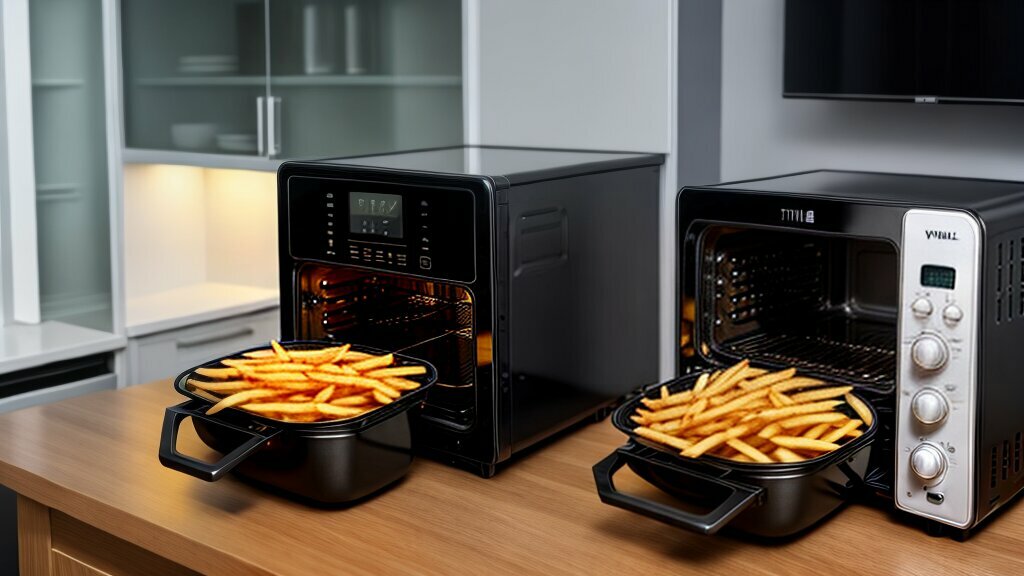
As a professional copywriting journalist, I’ve noticed that modern kitchens are equipped with a range of appliances that make cooking easier and more efficient. Two appliances that have gained popularity in recent years are the convection microwave and air fryer.
While both appliances have become essential for many home cooks, there are differences in their functionalities that can affect their suitability for individual cooking needs. In this article, I’ll highlight the key differences between convection microwaves and air fryers to help you decide which one suits your cooking requirements best.
Key Takeaways:
- The convection microwave and air fryer are two popular kitchen appliances that have different functionalities.
- Convection microwaves combine microwave and convection cooking methods and allow for browning and crisping of food, while air fryers use minimal to no oil to fry food.
- Both appliances offer convenient cooking methods, and the choice between a convection microwave and an air fryer depends on individual cooking needs and preferences.
Understanding Convection Microwaves
Before comparing convection microwaves to air fryers, let me explain what exactly a convection microwave is. It’s a kitchen appliance that combines two cooking methods to give you fast and efficient cooking results.
| Microwave Cooking | Convection Cooking |
|---|---|
| Uses electromagnetic waves to heat food | Uses hot air to cook food, resulting in browning and crisping |
| Fast and efficient | Slower than microwaving, but allows for more cooking options |
| Great for reheating | Ideal for baking and roasting |
Some convection microwaves also come with additional features like grilling and steaming. They are available in various sizes and designs, so you can choose one that suits your kitchen needs and matches your aesthetic.
One thing to keep in mind is that convection microwaves tend to be more expensive than traditional microwaves, but they offer more convenient and versatile cooking options.
The Allure of Air Fryers
As someone who tries to maintain a healthy lifestyle, I was immediately drawn to air fryers. These innovative kitchen appliances have taken the culinary world by storm, offering an alternative to traditional deep frying. Like convection microwaves, air fryers use a combination of heat and air circulation to cook food. But instead of oil, air fryers use hot air to fry food, making them a much healthier option.
One of the key advantages of air fryers is the versatility they offer. You can use them to cook a wide range of foods, from chicken wings to french fries to vegetables. The hot air ensures that the food is evenly cooked, resulting in a crispy outer layer without the need for additional oil or grease.
Another selling point of air fryers is their ease of use. You simply need to add the food to the fryer, set the temperature and time, and let it do its magic. Many air fryers come with preset cooking functions, making it even easier to cook specific foods.
One aspect that I particularly appreciate about air fryers is the ability to enjoy fried foods without feeling guilty. By eliminating the use of oil, air fryers significantly reduce the calorie and fat content of the food, making it a healthier option for those trying to maintain a balanced diet.
Key Differences Between Convection Microwaves and Air Fryers
When choosing between a convection microwave and an air fryer, it is essential to understand the key differences between the two appliances. Here are some factors to consider:
| Feature | Convection Microwave | Air Fryer |
|---|---|---|
| Functionality | The convection microwave combines microwave and convection cooking methods, allowing for both quick heating and browning/crisping of food. | The air fryer uses hot air to fry food with little or no oil, creating a healthier alternative to traditional frying methods. |
| Cooking Capacity | Convection microwaves typically have larger cooking capacities, making them suitable for families or cooking large dishes. | Air fryers usually have smaller capacities, making them ideal for individuals or couples. |
| Design | Convection microwaves are available in a variety of designs, including countertop or built-in options, and can be used for multiple cooking methods. | Air fryers are compact and portable, making them easy to store in small kitchens. They are primarily designed for air frying, although some models do offer other cooking options. |
| Price | Convection microwaves vary in price depending on their features and capabilities, with some high-end models costing upwards of $1,000. | Air fryers are generally more affordable, with basic models starting at around $50 and high-end options costing up to $500. |
Ultimately, the choice between a convection microwave and an air fryer will depend on your cooking needs and preferences. While both appliances offer convenience and faster cooking times, they have different functionalities and limitations.
For example, if you are looking for a kitchen appliance that can handle multiple cooking methods and larger dishes, a convection microwave may be a better fit. Alternatively, if you want a healthier alternative to traditional frying methods and have limited kitchen space, an air fryer may be the way to go.
It’s important to consider your lifestyle, cooking habits, and available space before making a decision. Both options can be great additions to a modern kitchen, so it ultimately comes down to what works best for you.
Similarities Between Convection Microwaves and Air Fryers
While convection microwaves and air fryers have distinct functionalities, they also share several similarities.
- Both appliances offer a convenient way to cook meals quickly, saving time and energy in the kitchen.
- They often come with preset cooking functions, making it easy to select the right settings for your dish.
- Convection microwaves and air fryers are user-friendly and generally require minimal maintenance.
- They are both versatile appliances that can be used for a variety of cooking needs, from reheating leftovers to preparing full meals.
Whether you’re looking to upgrade your kitchen with a convection microwave or an air fryer, it’s worth considering these shared features to determine which appliance suits your cooking style and needs best.
Which One is Better: Convection Microwave or Air Fryer?
Choosing between a convection microwave and an air fryer depends on your specific cooking needs and preferences. Here are some factors to consider:
- Cooking methods: If you want a versatile appliance that can bake, grill, and roast in addition to microwaving, a convection microwave may be the better choice. If you want an appliance that can fry food with minimal to no oil, an air fryer is the way to go.
- Lifestyle: If you have a busy lifestyle and need to save time in the kitchen, either appliance can be a great time-saver. However, an air fryer may be particularly convenient for quick and easy cooking of frozen foods, while a convection microwave can help you prepare meals from scratch while still saving time.
- Space: If you have limited counter or storage space in your kitchen, an air fryer may be a better option since it’s typically smaller and more compact than a convection microwave.
- Preference: If you prefer the taste and texture of fried foods and want a healthier alternative, an air fryer may be the way to go. If you prefer the taste of oven-baked or grilled food, a convection microwave may be a better fit.
Ultimately, the decision between a convection microwave and an air fryer comes down to your individual needs and preferences. Both appliances have their own unique pros and cons, and neither is definitively better than the other. It’s important to evaluate your cooking habits and determine which appliance will best fit your lifestyle and provide the cooking methods and features that you need.
Conclusion
After comparing convection microwaves and air fryers, it’s clear that both appliances offer unique features and benefits for cooking in the modern kitchen.
When deciding which one is right for you, consider your specific cooking needs and preferences. If you want a versatile appliance that can both microwave and convection cook with added benefits of browning and crisping, a convection microwave might be the best option for you. On the other hand, if you prioritize healthier cooking options and enjoy the taste and texture of fried foods, an air fryer could be a great choice.
Take Your Time and Evaluate Your Needs
It’s important to evaluate your cooking habits and lifestyle needs before making a final decision. Take your time to consider the pros and cons of both appliances and how they fit into your daily routine.
Remember that both convection microwaves and air fryers offer convenient cooking methods that can save time and energy in the kitchen. Upgrading your kitchen with either option can enhance your cooking experience and provide delicious meals for you and your family.
FAQ
Q: What is the difference between a convection microwave and an air fryer?
A: Convection microwaves combine the functionalities of a microwave and a convection oven, allowing for browning and crisping of food. Air fryers, on the other hand, use hot air circulation to fry food with minimal to no oil.
Q: What are the key features of convection microwaves?
A: Convection microwaves offer a combination of microwave and convection cooking methods, allowing for versatile cooking. They can brown, crisp, and cook food quickly, making them a convenient option in the kitchen.
Q: How do air fryers work?
A: Air fryers use hot air circulation to fry food. They cook food evenly and with a crispy texture, often eliminating the need for excessive oil. Air fryers are a healthier alternative to traditional frying methods.
Q: What are the main differences between convection microwaves and air fryers?
A: Convection microwaves offer a wider range of cooking functionalities, including microwave, convection, and combination cooking. Air fryers specialize in frying food using hot air circulation. The design and cooking methods of each appliance also vary.
Q: What are the similarities between convection microwaves and air fryers?
A: Both convection microwaves and air fryers offer convenient cooking methods and save time and energy in the kitchen. They often come with preset cooking functions, making them easy to use. Both appliances offer versatility in cooking different types of food.
Q: Which appliance is better for me: a convection microwave or an air fryer?
A: The choice between a convection microwave and an air fryer depends on your specific cooking needs, lifestyle, and preferences. Consider factors such as the type of food you cook most frequently and the cooking methods you prefer. It’s important to weigh the pros and cons of each appliance to make an informed decision.
- 3 Best 30-Inch Gas Cooktops with Downdraft for 2026 - February 21, 2026
- 1 Best Induction Cooktop Protector for 2026 - February 21, 2026
- 2 Best Glass Cooktop Scrapers for 2026 - February 20, 2026
